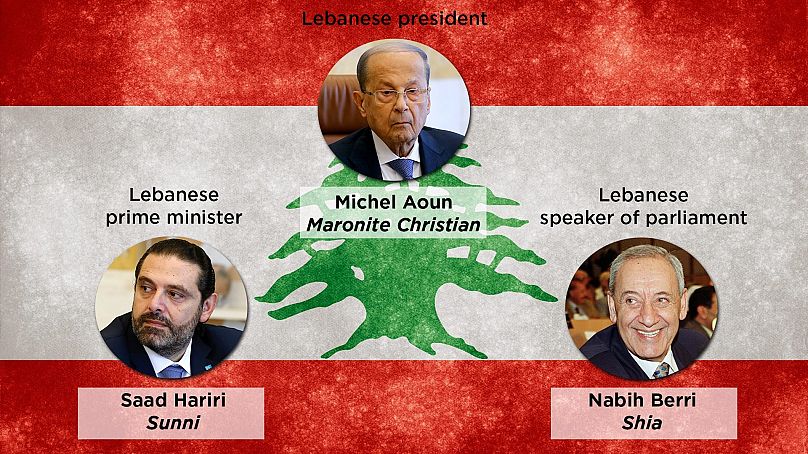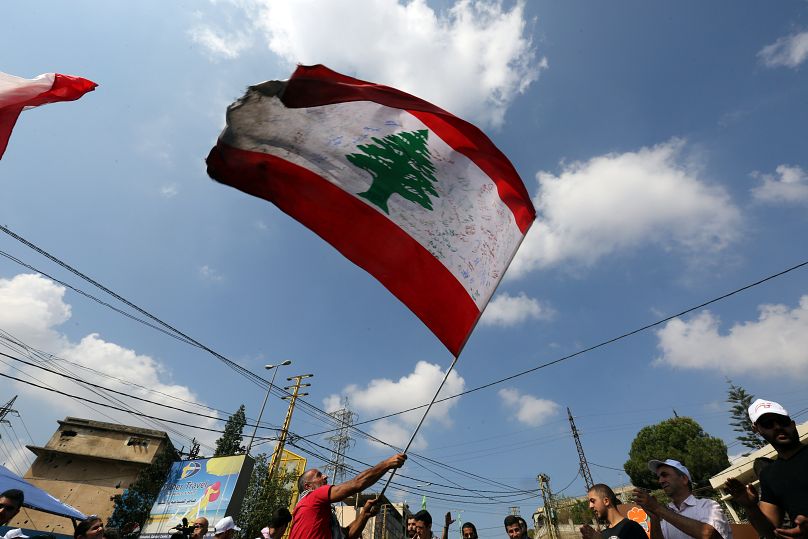Not very well, say many Lebanese.
Lebanon's leaders are under pressure to make radical changes to how the country is run as crippling economic conditions and anger at perceived government corruption trigger widespread protests.
 ADVERTISEMENT
ADVERTISEMENT
 ADVERTISEMENT
ADVERTISEMENT
The country is governed by a power-sharing system aimed at guaranteeing political representation for all of the country's 18 sects, but does it work? Euronews takes a look.
How does it work?
A legacy of French colonial rule, Lebanon's government is designed to provide political representation of all Lebanese religious groups, with its three largest being Christian Maronites, Sunni Muslims, and Shiite Muslims.
The number of seats in parliament is split between Christians and Muslims and proportionally divided among the different denominations within each religion. Government posts and public-sector positions are also divided among the majority sects.
The president must always be a Maronite Christian, the prime minister a Sunni and the speaker of parliament a Shia.
The system, however, has created "entrenching divisions between all 18 recognised religious sects," said Lina Khatib, director at Chatham House's MENA programme and research associate at SOAS, "as each sect representative used their position in government to only serve the interests of the sect and themselves instead of the national interest."
How does each executive role function?
The president has the authority to put laws passed by parliament into effect, to ask for additional regulations to ensure the execution of laws and negotiate or ratify treaties.
Michel Aoun was elected to parliament in October 2016. He is the founder of the Maronite Christian political party, the Free Patriotic Movement (FPM).
The parliament plays a significant role when it comes to financial affairs, and its responsibilities include passing the budget.
The current prime minister Saad Hariri, a Sunni Muslim businessman, who has been in the role since 2016.
After the assassination of his father, former Prime Minister Rafik Hariri in 2005, he entered politics and created the Future Current political party.
What does the government look like now?
Earlier this year, Lebanese factions were able to agree on a new government after months of uncertainty as rival political groups were locked in disagreement over the future make-up of the government.
In the end, the Shiite militant group Hezbollah made large gains while Hariri's party lost more than a third of its seats.
For the first time, Hezbollah holds the Ministry of Health, which has one of the biggest budgets and the Finance Ministry remained in the hands of a man believed to be a Hezbollah ally, Ali Hassan Khalil.
Another historic moment for the government was the inclusion of four female ministers, doubling their representation.
Does religion play a role in Lebanese politics?
Yes, because even if Lebanon's political system is based on confessionalism — a system of government that is a de jure mix of religion and politics — religion manifests itself as a tool of political power rather than faith, according to Khatib.
"Very little discussion of religious beliefs is present in political life. Rather it is about which religious group can get more power and serve its own community more, unfortunately often at the expense of other communities and the national interest," she said.
Where has the government gone wrong?
Lebanon's deepening economic woes partially sped up the process of electing a new government as protesters took to the streets complaining about the delay to form a government.
After the formation of the new government, Hariri told the media the economy would be the priority.
“There isn’t any more time to waste,” he said. “We owe the Lebanese an apology for the delay, especially to the young men and women waiting for a glimmer of hope to fix conditions.”
On Monday, Lebanon approved an emergency package of economic reforms, which included halving the salaries of government ministers and lawmakers.
Hariri announced that in the next three weeks. the government would approve the first phase of a capital investment programme that donors have pledged to finance with $11 billion conditional on Lebanon implementing reforms.
The government also approved a 2020 budget with no new taxes and a deficit of around 0.6% compared to the targeted level of around 7% for 2019, Hariri said.
The ministry of information and other public institutions will be cut as part of cost-cutting measures. Other institutions will be merged together to save money.
The government also approved the establishment of a committee to fight corruption.
The long-delayed reform of the state-run power sector, which takes $2 billion from the treasury every year while failing to deliver enough power for the Lebanese who depend on private generators to fill the gap will be accelerated.
Lebanon has one of the world's highest levels of government debt as a share of economic output.
Why are the Lebanese still protesting?
Many people remain unconvinced by the promises of politicians.
Ending rampant corruption is a central demand of the protesters, who say the country's leaders have used their positions to enrich themselves for decades.
Maya Mhana, a teacher listening to the speech in central Beirut with other protesters, told Reuters she was not convinced. "We are remaining in the streets, we don't believe a single word he said."
"Lies, lies, lies," said another protester who declined to give his name. "They have been governing for a long time. If they had wanted, they could have done anything."
"Lies, lies, lies," said another protester who did not want to give his name. "They have been governing for a long time. If they had wanted, they could have done anything."
According to Khatib, it would take a lot of grassroots effort to change the current political system.
"The political elites cling on to it because it guarantees them political and economic privileges. But popular frustration with the system is growing and is a key driver behind the current protests in Lebanon."












